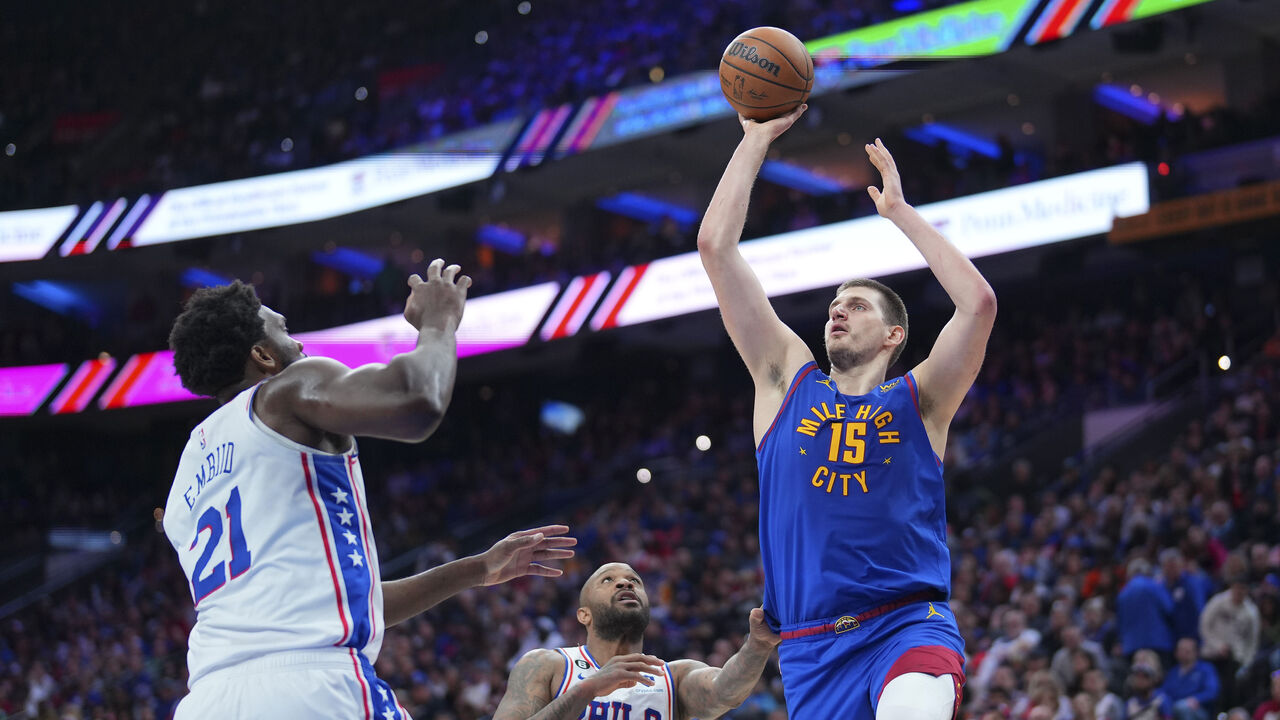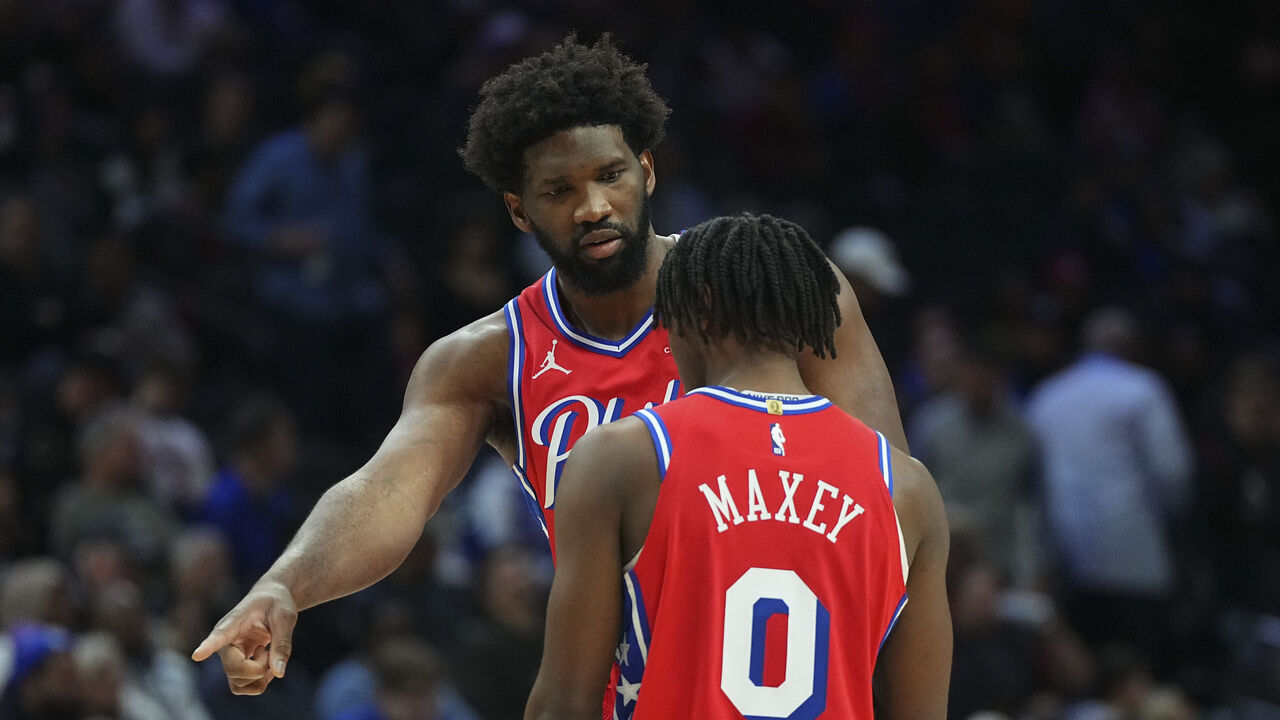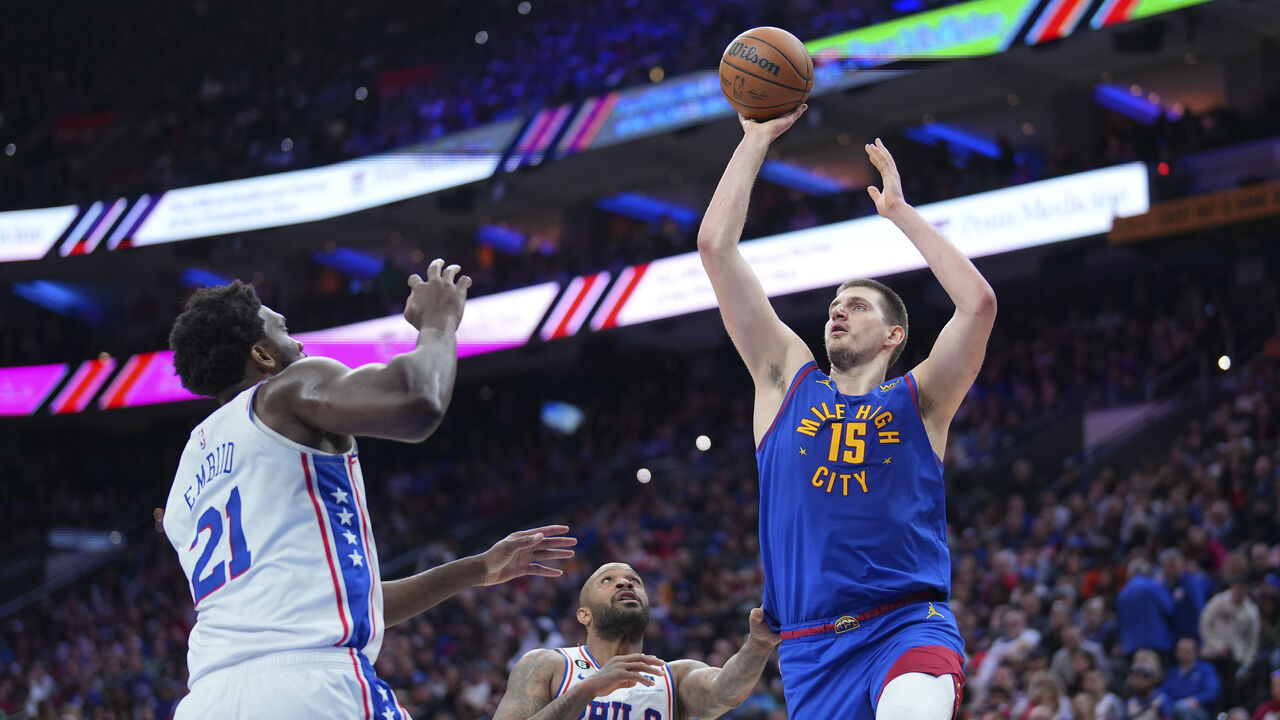How Jokic and Embiid keep consolidating their MVP duopoly
When Joel Embiid and Nikola Jokic finished first and second in MVP voting last season, they were just the second pair of players in NBA history to finish top two for three consecutive years, matching the run LeBron James and Kevin Durant put together from 2012-14. If the 2023-24 campaign ended tomorrow, there’s a good chance that the two paradigm-breaking centers would extend their MVP duopoly to an unprecedented fourth year.
There’s obviously a very long way to go; both guys will need to stay healthy while sustaining their astronomical level of play to fend off both voter fatigue and spirited challenges from the likes of Shai Gilgeous-Alexander, Giannis Antetokounmpo, Luka Doncic, Tyrese Haliburton, Devin Booker, Jayson Tatum, Steph Curry, Durant, James, and others. But if current trends hold, it’ll be hard to dismiss the cases of two giants putting up mind-boggling stats and exerting colossal two-way impact while carrying contending teams.
Jokic is averaging 27.2 points, a league-leading 12.7 rebounds, and 9.4 assists, while Embiid is at 33.8, 11.5, and 6.4, along with 2.9 combined steals and blocks. They rank in the top two or three (with Gilgeous-Alexander the most common interloper) in almost every publicly available catchall metric – from PER to Box Plus-Minus to Estimated Plus-Minus to win shares and beyond. (Jokic’s BPM is currently the highest of all time, while Embiid’s PER would break Jokic’s record set two seasons ago.)
It’s gotten too easy to take their exploits for granted, which is understandable. We know how great these guys are, and we recognize what makes them great, so what else is there to say? How many times and in how many different ways can we extol Jokic’s passing vision and footwork and touch, or Embiid’s power, post artistry, and mid-range bag?
But in an era that arguably features the deepest pool of elite talent we’ve ever seen, it’s worth taking stock of how Jokic and Embiid continue to swim ahead of the pack. The two were deemed the NBA’s best in 2020-21, and all they’ve done since is strengthen their grip on the league’s most prestigious piece of regular-season hardware.

Let’s start with Jokic, who’s probably been the best player in basketball for the balance of this season despite shooting 18-for-58 last week in the worst two-game stretch of his career. If not for a pre-playoff lull after the Nuggets all but secured the top seed in the West last season, he might well be hurtling toward a fourth straight MVP right now.
Jokic’s redoubled effort to create for himself is one big change this season. Once upon a time, the book on him was that he was a reluctant shooter, and the most sensible way to defend him was to force him to be a scorer. Now he ranks seventh in the league in scoring on a per-possession basis and fourth in usage, both of which are career highs.
Jamal Murray missing half the season so far has a lot to do with that. We’ve seen Jokic take on a heavier offensive burden in the absence of Murray before, most notably during his second MVP season in 2021-22, when Murray was sidelined the whole year. But this season he’s soaking up even more responsibility as a scorer and playmaker: more shooting possessions, more assists, more elbow touches, more post touches, more everything. Furthermore, he’s reduced his turnover rate to a career-low 10.7%, way down from 17% last season and 15% for his career. That’s why all-in-one metrics portray him as an even more efficient offensive player than he was a year ago despite him losing more than 9 percentage points of true shooting (70.1 to 61.0).
His touch has been weirdly askew (by his standards) and he’s been significantly less accurate than last season from every level of the floor: rim, short mid-range, long mid-range, and 3-point range. But even with that decline, he’s reverse-pivoting and tear-dropping and Sombor Shuffling his way to an absurd 57% from floater range and 55% on all non-rim 2-pointers (league average is 43%). And the dip in accuracy has in no way changed how he’s defended – regularly eliciting double- and even triple-teams in the post – or his unique ability to leverage all the attention he draws.
Every game, Jokic throws five passes that would represent the best pass ever thrown by 99% of the league. Every game, he head-nods teammates into cuts and drifts before hitting them with passes that seem to travel through wormholes in space-time. One second the ball is in his hands, the next it magically appears in the hands of an open Nugget:
He’s such a wizard with the ball that it obscures what a brilliant off-ball player he’s become – the way he zigzags around wedge screens to carve out deep post position, jets off of pindowns to get free for mid-range jumpers, and burns unsuspecting defenders with deceptively explosive cuts:
Because of how deadly he is as both a scorer and passer on the roll, and because it’s completely untenable to switch a smaller player onto him, defenses now often employ a “don’t leave Jokic” tactic when he screens for teammates, keeping his primary defender glued to him even if it means giving the ball-handler an open driving lane. He’s almost gotten to Curry’s level of warping the court and facilitating ultra-efficient offense without even touching the ball. The Nuggets score 19 more points per 100 possessions with him on the floor, the biggest differential in the league for a second straight year.
His defense has largely picked up where it left off at the end of Denver’s title run – which is to say, it’s been reliably solid. He still spends a lot of his time up at the level, but he’s become a more proficient drop defender and back-line helper. Defensive impact stats continue to adore him, probably because he remains the best defensive rebounder in the game. That’s no easy feat considering how often the Nuggets’ pick-and-roll coverage pulls him out to the perimeter, but his giant velcro hands consistently snare boards in a crowd despite having a vertical leap that’s roughly equivalent to the width of a Chet Holmgren bicep.
Though the Nuggets are a modest 9-8 since starting the season 8-1 and can’t seem to solve those pesky Rockets, they’re still clearly the team to beat out West. Jokic is still clearly the reason why.

Embiid, meanwhile, is leading the league in points per game for the third straight season, 1.5 clear of Doncic. He is once again racking up those scoring numbers with gobsmacking efficiency: 56% from 2-point range (including 50% on long mid-rangers) and 88% from the free-throw line (on nearly 12 attempts per game), good for 64% true shooting on a league-high 37% usage rate. No defender alive can counter his combination of size and agility on the block, to say nothing of the tightened handle and improved pull-up shooting that make him damn near automatic out of the triple-threat at the nail.
Before Embiid won his first scoring title two years ago, no center had claimed one since Shaquille O’Neal in 2001. If he wins a third, he’ll be the first center to do so since Bob McAdoo in 1976. You can make a compelling case that Embiid is the best scoring big man since Wilt Chamberlain. And that arguably hasn’t been the biggest story of his season so far.
While Jokic has grown by becoming a more assertive scorer, Embiid has expanded and refined his playmaking capabilities. The number that jumps out most is his assist average, way up to 6.4 from last season’s career high of 4.2.
An important caveat: Much of that uptick can be attributed to context and the way the 76ers’ personnel and system has changed around Embiid. New head coach Nick Nurse reoriented the offense to flow through Embiid at the top of the floor. Combined with Tyrese Maxey’s ascension to lead guard in the wake of James Harden’s holdout and eventual trade, the Sixers went from 29th in handoff frequency to fifth. Embiid has already thrown (or handed) more assists to Maxey (35) than he did to Harden (33) all last year.
That’s because Maxey is a far more dangerous dribble-handoff and off-ball weapon. He’s a threat to explode downhill, dust closeouts, and pull quick-trigger jumpers off the catch in a way Harden never did as a Sixer. So, using Maxey in the DHO game or stationing him one pass away when Embiid posts up is a whole lot more potent. To wit: Maxey is attempting 3.4 threes per game off the catch (compared to 1.8 from Harden last year) and hitting 50.7% of them, second only to Durant among high-volume shooters. He’s finishing 2.8 possessions per game off of handoffs (compared to Harden’s 0.7) and averaging 1.29 points on those possessions, second only to Curry.
I’ve watched all 127 of Embiid’s assists this season; 36 of them have come out of dribble handoffs or pitch plays, and another 57 have come on what I’d call basic reads, mostly one-pass-away kickouts out of face-ups or post doubles. That’s not to discredit what he’s doing. For one thing, it says a lot about his immense scoring gravity that so many of those basic passing reads are available in the first place. For another, it’s a testament to his adaptability that he’s thriving in a different role from the one he played last season, when he thrived in a different role than the one he played the season before that.
Embiid made strides as a low-post passer a couple of years ago; his improvements this year have been more about what he can do as a high-post hub and as a playmaker on the move. He’s been much more empowered to push the ball after defensive rebounds and has proven to be a very capable creator in the open floor. (Of the assists I tracked, 12 were transition hit-aheads.)
In the half court, where his pick-and-roll with Harden made him arguably the league’s best play finisher, his two-man dance with Maxey is far more dynamic and gives him greater decision-making authority. You’ll regularly see him dabble in fake handoffs, thread through-the-legs bounce passes to Maxey on the exchange, or keep the ball and wait for Maxey to curl all the way around before guiding him to the rim. Sometimes you’ll see them flip things around, with Maxey pitching the ball back to a driving Embiid. Outside of Jokic-Murray, it’s probably the best and most varied two-man game going right now.
Also, Embiid’s back-to-the-basket passing has taken another step forward. He’s dealing with double-teams more capably and making reads faster than ever, especially when it comes to hitting cutters out of the weak-side corner. Kelly Oubre Jr. has been particularly adept at making those cuts, while Tobias Harris has gotten a ton of layups by cutting backdoor off of Embiid’s elbow touches:
Embiid is doing all this while anchoring a top-10 defense. When Nurse arrived, he talked about wanting to use Embiid in new ways. Given Nurse’s history, people presumed Embiid would be deployed as a hard-hedging ball hawk. But far more often, Nurse has kept him in a one-man zone to ensure that he’s the low man as often as possible. That helps Embiid preserve energy for the offensive end, but it also leans into his strengths.
He’s contesting more shots at the rim (10.6) than anyone in the league, not only this season but in the entire 10-year NBA.com database. He’s doing that while holding opponents to 52.1% shooting on those at-rim attempts, the eighth-lowest mark among 38 players contesting at least five rim shots a game. He’s also a 99th-percentile rim deterrent, according to Cleaning the Glass. So in other words, Embiid is dissuading opponents from shooting at the rim, and he’s contesting the hell out of basically every shot they do try there when he’s on the court.
The Sixers are 16-4 with Embiid in the lineup, and their 123.7 offensive rating with him on the floor is actually better than Jokic’s on-court mark (122.5) for the first time in their careers.
The last three years of MVP debates have naturally pitted the two against each other. Comparison is unavoidable given the plaudits they’re vying for, but that shouldn’t come at the expense of appreciating the extraordinary things they’re both doing. It would be reductive and trite to say they’re playing chess while the rest of the league is playing checkers. What they’ve actually done is turn the NBA back into a place in which, just like on a chess board, the biggest pieces are the ones that matter most.


